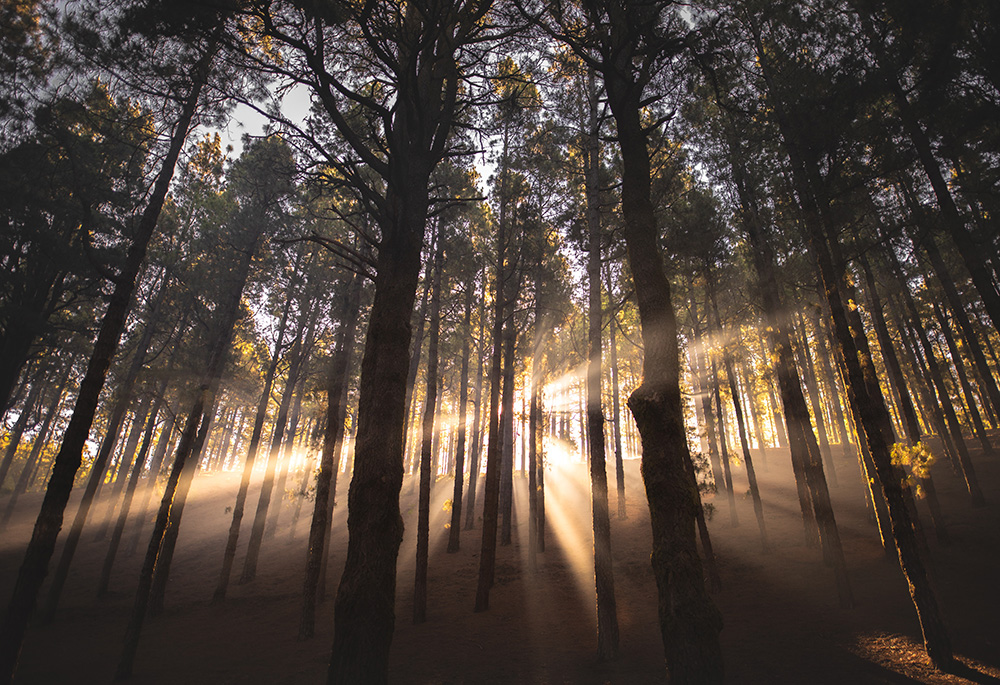
(Unsplash/David Monje)
"God will get you for that!"
That was one of my mom's favorite retorts when we teased her as children. I would counter, saying that she called on God only because she couldn't think of a better comeback. "Why make God do all your work?" (If we're lucky, God will get us caught up in the divine trajectory.)
Our play had nothing to do with serious theological discussion, but it did reflect some worn-out concepts of karma or God's rule in the world. A simplified explanation of the Hindu idea of karma says that good actions will bring a person a good future, and bad will bring bad. We know that Jesus tried to free people from that type of thinking. He taught that illness was not the result of sin (John 9) and that those who followed him would suffer as he did. So much for religion as an insurance policy!
Once we move beyond the idea of God as the fixer or avenger of evil, where are we to go? Today's reading from the Book of Wisdom starts us off on a path toward a wonderful alternative.
"There is no god besides you, who have care for all." How different might the world be if we made that our credo? If that were the one thing we really believed? Wisdom's author goes on with more descriptions of what God is like: Divine power generates justice, God's strength engenders lenience and finally, "You gave your children good ground for hope."
In Jesus the Forgiving Victim: Listening for the Unheard Voice, Theologian James Alison suggests this summary of Jesus' message: "I know that you find it very difficult to believe that God loves you … you are inclined to be frightened … you are inclined to run from death [and] engage in all sorts of forms of self-delusion and self-destruction. You find it difficult to imagine that things really will be well and that you are being held in being by someone who is utterly trustworthy. All this I know."
Keeping that in the back of our mind, we might approach today's readings as an invitation to a renewed sense of God and ourselves. After hearing Wisdom's description of God's immensity as the source of God's loving kindness, we turn to Paul's teaching about prayer.
Paul says, "We do not know how to pray as we ought." Now there's a comedown for all of us celebrating the liturgy and singing our hearts out! What are we supposed to think? Might Paul be reminding us that we tend to look toward God on our own terms (the "God will get you" mentality, for example) — and that there's a better, truer way available to us?
Paul says, "The Spirit intercedes for us with inexpressible groanings." Wow! That's what prayer is supposed to be? Inexpressible groanings? That's the same word Paul used in what we heard last week (July 16) as he talked about the longing of all creation to come into fulfillment. If Ignatius of Loyola were asked about this, he'd tell us that we can only get in touch with our deepest desires with the help of God's Spirit and that our deepest desires ultimately lead us to union with God. No wonder we groan! It's no small feat to reach that depth, to be in touch with the longings at the heart of our very being.
Advertisement
At this point, Jesus' words in the Gospel come as a comforting assurance. Knowing that weeds grow in the midst of wheat, Jesus tells us not to worry about failures. God's reign is like the mustard seed — a dynamic that can't be stopped. It's like yeast, an energy that permeates everything with which it comes into contact. Although we want to do good (and sometimes not), the future is not of our making. Everything — past, present and future — comes from the God who cares. God is beckoning us. The Spirit's groaning within us promises that there is more coming than we could ever ask or imagine.
Today's Liturgy of the Word invites us to wonder and believe in God's care. Believing that the weeds will come to nothing, we can marvel at growing wheat; a sprouting mustard seed; the intoxication of yeast. Let us abandon contentment with limiting images of God and assumptions that we know how to pray. It's time to let creation sweep us into awe at what is bigger, more beautiful, deeper, broader — more of everything than we can imagine.
The Spirit is waiting to come to our aid. To the extent that we allow it, God will do the work of drawing us into an ever-expanding future and we will reflect more and more of the God who loves us into growth. God will do the work — not for us, but with and within us.
